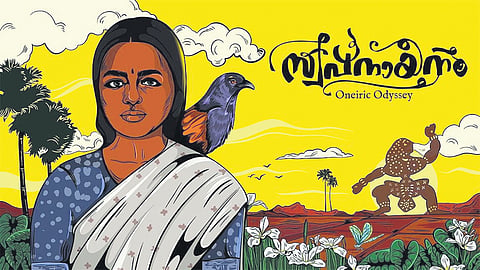

THIRUVANANTHAPURAM: The 29th International Film Festival of Kerala (IFFK) opened on December 13 with Swapnaayanam, a signature film that took audiences on a nostalgic journey through the legacy of Malayalam cinema. The minute-long film is written and directed by Mumbai-based cinematographer K O Akhil, who has captured the very beginning of Kerala’s cinematic heritage, the historic notice announcement of ‘Vigathakumaran’, the first film in Malayalam that was directed by J C Daniel.
On the inspiration behind the project, Akhil said, “The seed concept was the collective experience of watching a film together. When making a signature film for a festival like IFFK, it should be deeply rooted in history. The idea was to create something that not only paid homage to the beginnings of Malayalam cinema but also highlighted how far we have come. The transformation of cinema spaces - from Capitol Theatre, where Vigathakumaran was screened, to today’s modern theatres, was a story worth telling.”
Akhil took on multiple roles for the project, including direction, cinematography, concept development, and screenplay. He crafted this hybrid work blending 2D, 3D, animation, live-action, and VFX. Out of nearly 15 entries, the jury selected his vision to be featured on the board.
“It was a challenge but also a privilege to handle so many aspects of the film. It allowed me to shape the narrative exactly as I envisioned it,” Akhil said.‘Swapnaayanam also pays tribute to P K Rosy, the heroine of Vigathakumaran. The film ends with a visual of Rosy, portrayed by Abhirami Bose, enjoying a movie in a modern theatre.
“Looking back almost 95 years, a tragic event occurred in the same city that marked the birth of Malayalam cinema, an event that remains a disgrace to our history. The first gathering for the cinematic experience was shattered, and we know it was marred by caste-based atrocities. At the time, watching a film was a privilege reserved for only a select few, and that privilege deserves questioning. So for me, P K Rosy is not a victim. She is a symbol of courageous resistance.
The common portrayal of her as submissive does not do justice to her strength. I wanted to imagine a world where Rosy’s dreams were realised, where she could enjoy the art she was once punished for. That thought became the emotional anchor of the film,” Akhil explained.
Akhil’s journey in creating the signature film was a collaborative effort involving his classmates from the K R Narayanan National Institute of Visual Sciences and Arts and the Film and Television Institute of India (FTII) in Pune.
“Working with friends who share the same passion for cinema was nice. Everyone contributed their best to make sure the film became special. Also, some scenes were shot in FTII, and some of its staff and students can be seen in some scenes,” he said. For Akhil, directing the signature film for IFFK has been a dream come true.
“It’s not just a professional milestone but also a personal one, as cinema has always been close to my heart. I have been a regular visitor to the IFFK, which, I believe, is a pilgrimage for any cinephile. The signature film is something we always look forward to at the beginning of every festival. So, this is very special to me,” he said.